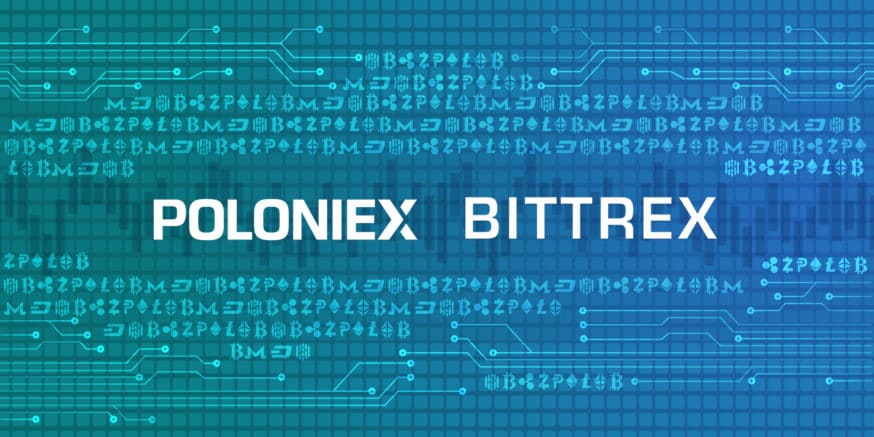- Poloniex vs Bittrex: Key Information
- The Court of Public Opinion
- User Interface
- Security
- Fees
- Available Currencies on Each
- Final Thoughts
Bittrex and Poloniex are currently two of the most popular exchanges for cryptocurrencies, specifically for their bitcoin to alternative (altcoin) trade-pairing options.
In this Bittrex vs. Poloniex review, we’ll go over everything from the key features of each platform, who and what each platform is best suited for, and more.
Poloniex vs Bittrex: Key Information
Whatever path led you to looking up either of these exchanges, one thing is clear: you’re ready to make the jump from trading or investing in basic coins (BTC, ETH, LTC) to dabbling in altcoins. Known for both their historically high returns in exchange for a high risk tolerance, these altcoins can be purchased from a variety of exchanges across the web.
With that said, just like when exchanging foreign currency, not all exchanges were created equal, nor might they have all of the trading pairs you’re looking for. However, a few quick searches on Google or Reddit for the best altcoin exchanges will always contain two of the best regarded out there — Bittrex and Poloniex. Not sure which one to choose? Check out our comparison below to find out which will be best for you:
| Reviews | Bittrex Review | |
| Site Type | Cryptocurrency Exchange | Cryptocurrency Exchange |
| Beginner Friendly | ||
| Mobile App | ||
| Buy/Deposit Methods | Cryptocurrency | Cryptocurrency |
| Sell/Withdrawal Methods | Cryptocurrency | Cryptocurrency |
| Trading Pairs | Bitcoin, Ethereum, Litecoin, and 90+ more | Bitcoin, Ethereum, Litecoin, and 270+ more |
| Company Launch | 2014 | 2014 |
| Location | Wilmington, DE, USA | Seattle, WA, US |
| Community Trust | Okay | Good |
| Security | Good | Good |
| Customer Support | Poor | Good |
| Verification Required | Yes | Yes |
| Fees | Very Low | Very Low |
| Site | Visit Poloniex |
One important aspect of these exchanges to note, is that neither of them accept fiat currency (USD, EUR, etc.) deposits, withdrawals, or trading. These exchanges deal exclusively in cryptocurrency. If you don’t yet own any cryptocurrencies, check out this list of exchanges.
The Court of Public Opinion
The public generally views both Bittrex and Poloniex positively, although both do generate their fair share of complaints.
Many users mostly complain about how the Poloniex customer support has taken weeks or even months to respond to support tickets. This is something that is incredibly frustrating, and it is disappointing that many first-time users were ushered into the crypto-world with such a negative first impression.
Bittrex, on the other hand, also receives a good amount of criticism for its customer service, but far less than that of Poloniex.
User Interface
When it comes to places you plan on exchanging your hard-earned money (whether brick-and-mortar or online), first impressions are everything. In addition to being functional and secure, both Bittrex and Poloniex have gone above and beyond to ensure their sites are also aesthetically appealing to the end-user.
When I picked my first altcoin exchange (before I started using multiple), I was actually in between choosing either Bittrex or Poloniex, finally making my decision based on which site looked more professional. Though it lacks the sexy “big bank” home page, Poloniex boasts a very basic, database-esque look that gives it some extra weight from the start.
Once inside, these characteristics really come out in the design and functionality of the trading side, though almost too simple at times. For example, finding the page that shows your balances and various wallet is a few clicks deep, under the “Deposit/Withdraw” page — certainly not the first place one would think to look.
On the other hand, Bittrex almost makes you feel like you landed on the wrong site when you first get to it. From a design standpoint, the homepage reminds you of a basic WordPress blog that just happens to have a “Login” button subtly placed in the navigation bar. If you’re curious to see screenshots, read anything detailed about the exchange, or do any research — good luck. In order to do any of these, you’ll need to first make an account.

Try them both for yourself, but in the end, I’d have to say Bittrex takes the win in this category.
Security
Similar to many of the current popular exchanges, both Bittrex and Poloniex were both formed and operated in the United States — out of Las Vegas and Delaware, respectively. Not only does this increase the likelihood of higher quality support, but adds the additional reassurance that these companies are subject to US laws and protection by the legal system. Due to this, both exchanges have placed a high priority on securing your digital assets through various means.
Bittrex was founded by Bill Shihara, Richie Lai, Rami Kawach, and Ryan Hentz — four former security professionals with more than 50 years of combined experience, coming from large companies like Microsoft, Amazon, Qualys, and BlackBerry. In terms of storing your coins, they also use an elastic multi-stage wallet strategy ensuring that 80-90% of funds are offline and safe. Finally, two-factor authentication is required for all withdrawals and API usage.
Similar to Bittrex, Poloniex also requires 2-factor authentication to both login and withdrawal currency from your account. While the background of the founders isn’t published on the site as it is with Bittrex, many people, including knowledgeable Reddit contributors, still believe that Poloniex is the better option in many regards. With that said, Poloniex was hacked back in 2014 and the attackers unfortunately made way with 97 BTC. Fortunately, Bitcoin was trading at less than $500 USD at the time, allowing Poloniex to pay their customers back very quickly while simultaneously introducing new safeguards to ensure it didn’t happen again.
Fees
In terms of fees, both exchanges differ slightly in terms of structure. While these minute differences will hardly be noticeable for the small-time investor, even the fractions of percent can make a difference for large-scale investors and day traders.
On Bittrex, commission fees are very straightforward and simple. No matter how much you trade from either a frequency or volume perspective, nor whether or not you “make” a new order or “take” an existing order off the books, you’ll simply pay 0.25% per trade. This is certainly nice when you want to just purchase coins quickly and not be concerned with whether a rapidly market cost beating your limit price will cost you an extra 0.10% on your trade.
The fee structure for Poloniex appears slightly more complicated at first glance, until you really start to read into it:
Every 24 hours, Poloniex will calculate the last 30 days of trading volume on your account (spot and margin combine) and dynamically adjust your fees according to the above schedule. However, as you may notice, you’d need to be trading more than 600 BTC worth of volume to qualify for lower fees — and only 0.01% at that.
If you’re not familiar with the maker and taker terminology, they’re exactly how they sounds. If you “make” an order by offering to buy a coin at a lower market price than the lowest “ask” price (or offer to sell higher than highest bid price), it theoretically wouldn’t fill instantly and you would only pay a 0.15% commission when it did.
On the other hand, if you “take” an order off the books (i.e. match your bid price equal to or greater than the lowest ask price), your order should fill instantly and you would be charged 0.25%. For every taker of an order, there was a maker of that order, so Poloniex is technically making 0.40% commission per complete trade.
Available Currencies on Each
When trading altcoins, in many cases the best returns will come from the small market cap coins that are only traded on one or two exchanges. Fortunately, both Poloniex and Bittrex offer a wide selection of coins to choose from, which may end up for better or worse depending on your impulsiveness and confidence.
At the time of writing this article, Poloniex is currently offering 96 different altcoins, with the top 20 (by 24 hour volume) as follows:
Though 96 altcoin options may be more than you ever need, Bittrex offers a staggering 259 trading pairs at the time of writing this article, with the top 20 (by 24 hour volume) shown below:
Solely due to the flexibility of scooping up small-cap altcoins and freshly released ICOs, Bittrex definitely takes the win here in terms of variety of coins available to trade on the exchange.
Additionally, it’s important to note that neither platform allows for the exchange of fiat for crypto. This is a frustration that many users have had to fill by using a secondary exchange such as Coinbase or GDAX.
Final Thoughts
When it comes to making a final decision whether to start your altcoin journey with either Poloniex or Bittrex, you can feel confident that there’s no right or wrong decision here. In the end, both sites safely allow you to purchase your coins and move them to their respective wallets in an efficient and cost-effective manner.
While Bittrex does hold the advantage of offering more coin options, there’s a good chance you’ll never even touch the majority of these exclusively offered trading pairs. However, if research is important to you, Bittrex may be the better choice for you.
On the other hand, if high-volume trading or saving 10 extra basis points in fees is important to you, the tiered fee structure offered by Poloniex may be of benefit to you. They’re both free and easy to create an account on, so feel free to try them both out and let us know with which one was your favorite!
Never Miss Another Opportunity! Get hand selected news & info from our Crypto Experts so you can make educated, informed decisions that directly affect your crypto profits. Subscribe to CoinCentral free newsletter now.
















